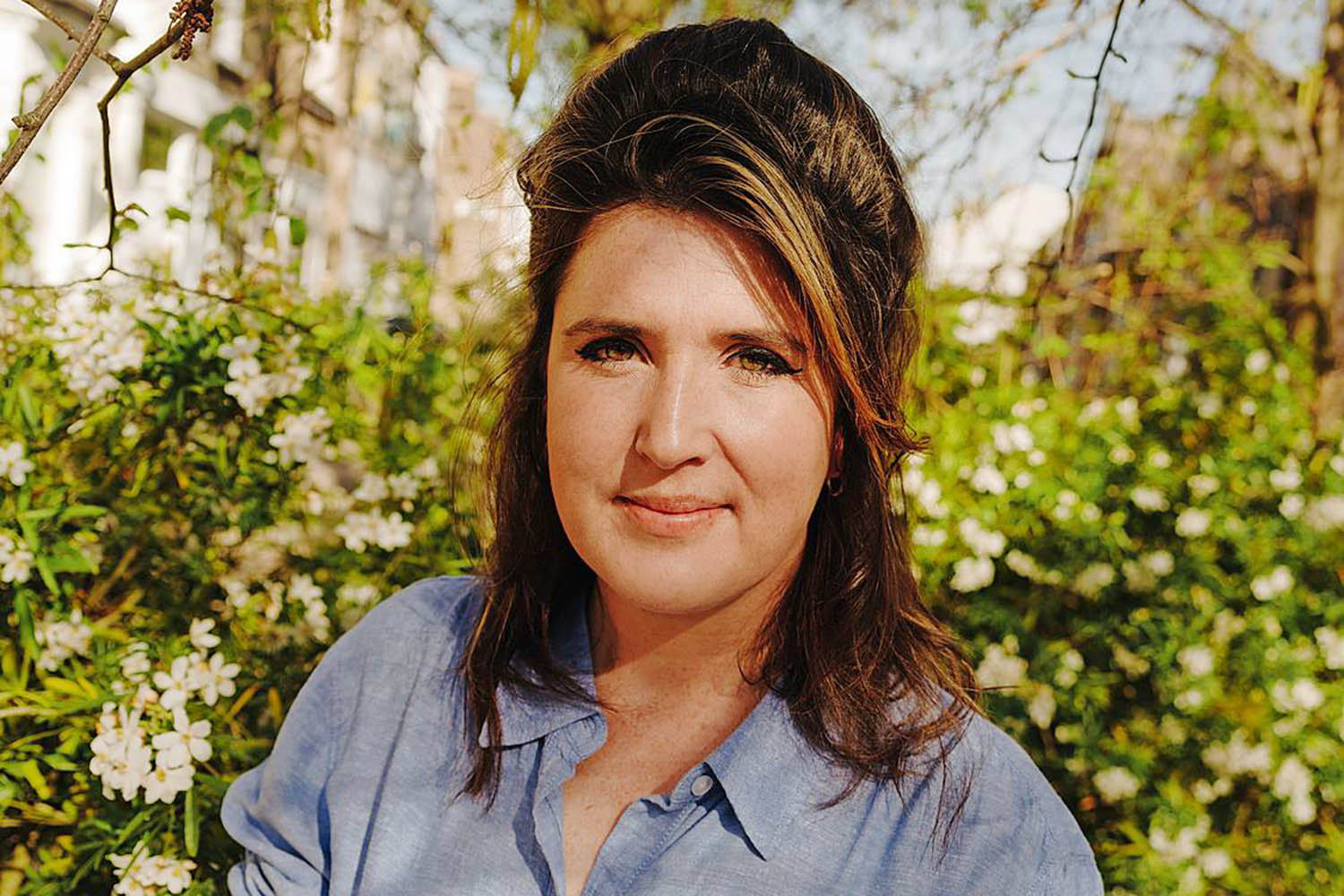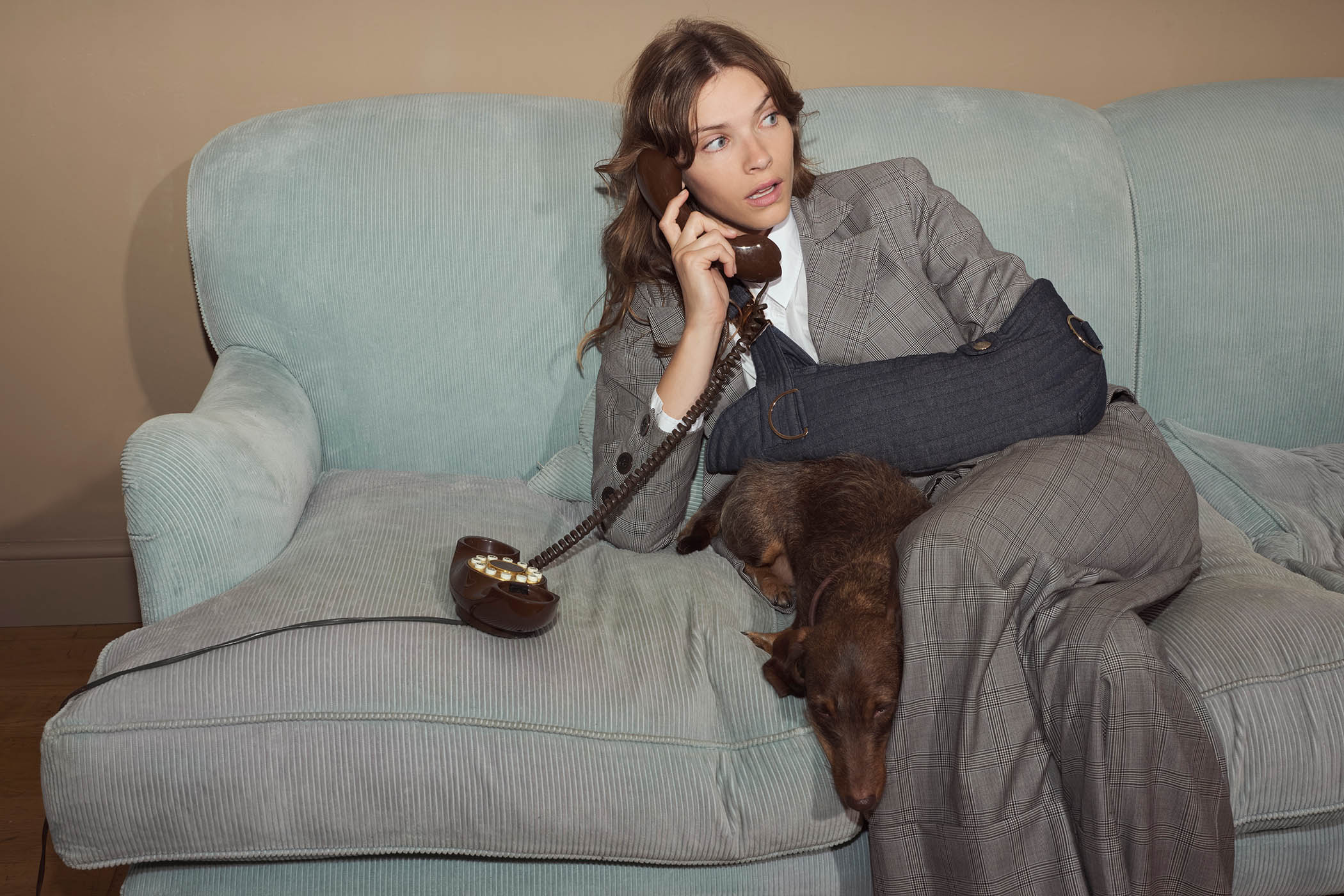Photograph by Dan Wilton
The moment I become sure it’s her, she’s standing in front of the frozen pizzas in Tesco Express. Her baby is tiny, even tinier than mine, and she wears him – this is important – in a carrier on the left side of her body. If she asks how I knew, this is what I’ll tell her: you wear your baby on the left, too. That’s how I could tell our bodies are the same.
In the summer of 2023, with my Caesarean scar still tender, I became spectacularly sick with ulcerative colitis. There is no on-ramp to this experience, no pissing about on the green slopes. One minute I am breastfeeding my newborn in front of Amanda and Alan’s Italian Job, the next I am doubled up on a hospital trolley, being told my colon is riddled with disease.
Like underfloor heating, you only bother to learn about colons when they go wrong. Still, I am struck by how little I know about the whole subterranean secret of the digestive system. The word stoma – meaning “mouth”, denoting a surgically made hole in the abdomen – is quite literally Greek to me. When doctors tell me I’ll need one to survive, I have no reference point. There are 200,000 people in the UK living with a stoma, but I do not know a single one of them.
“Is there a pamphlet?” I ask the surgeon. It’s the night before he’ll remove my colon and he’s come to introduce himself. “Even better!” says the surgeon, his tone a touch too jaunty. He produces a thick manual titled Living with a Stoma, stuffed with photos of cheerful octogenarians. In one, a silver fox identified as “Peter” changes his stoma bag with a smile that says: “See? Not so bad!” I get as far as a photo of a couple smiling meaningfully on a sofa (subheading: “Sexual intimacy with a stoma”) and close the manual, concerned I might scream.
Here are the images I long to see: two old friends gabbing away in the pub after last orders. A couple in a supermarket, bickering about what to have for dinner. A woman scooping up a sticky-faced baby at her ankles. I wouldn’t mind if they were stock photos, watermarked and too-brightly lit. I just want a hint that I’ll be able to step back into my old life.
Later, my favourite nurse, Sara, comes by. Word has got around that I will not be giving Living with a Stoma a five-star review. Sara explains it isn’t just older people who end up with stomas. “But in our defence,” she says, “they are the ones who normally ask for pamphlets.” I tell Sara I don’t know any stoma people. The correct term, she tells me, is ostomate. “Try Instagram,” she says. “There are more people like you than you think.”
In the days after surgery, I survey my perforated body with profound disbelief. I had thought I would feel grief for how it used to look and work, but it’s a bigger, lonelier feeling: the sense of crossing over to a land where I do not speak the language and know no one.
Ostomate. The word itches like a hire costume. One sleepless, morphine-spangled night, I type it into Instagram. It’s like stumbling into a Prohibition speakeasy through a hidden door. Here they are: a whole secret city of people with bodies like mine. Only it’s no secret at all. This city has been here all along and, to my shame, I had not known. There are women drinking negronis, stretching out on Balinese beaches like cats; men sweatily straddling bench presses. So far, so Instagram – the difference is the bag on their stomachs, proud and visible. Others take a rawer approach, sharing hospital visits, wound updates.
Beneath their profile names are pledges to raise awareness, break stigmas. Their self-acceptance feels mesmerising, but I know I’ll never share pictures this way or use the lexicon. I’m slightly too old and much too cynical. I notice the signature ostomate hashtag is #nocolonstillrollin and feel depressed that the rhyme doesn’t quite work.
Newsletters
Choose the newsletters you want to receive
View more
For information about how The Observer protects your data, read our Privacy Policy
Then I find Ben. Married with two kids, he’s a year on from his own stoma surgery and has the kind of open, friendly face that suggests he’d be good craic at the pub. I send him a message, explaining I’ve just had the op and that his videos have made me feel a bit less alone. I regret my earnestness instantly but, by morning, a voice note arrives. In the background, I can hear the hum of crickets, the sound of kids splashing in a hotel pool where he and his family are on holiday. I listen, wide-eyed and tearful from my hospital bed. This, I realise, is what I have been searching for. The sound of a life resuming.
When I get out of hospital, some amazing things happen. The first time is on the BBC reality show The Traitors. My boyfriend and I are cross-legged on the floor, playing with the baby, when there on our telly, 21-year-old Mollie Pearce casually shows her stoma bag to fellow contestants. We yelp, rewind, rewatch. Weeks later, the comedian Matt Forde reveals that, following spinal cancer, he now has a colostomy. “Look, we all go to the loo,” Forde grins in an interview. “Some of us go round the back and an elite few of us go round the front.” Not long afterwards, the papers are full of former Made in Chelsea star Louise Thompson’s announcement that she, too, has recently been fitted with a stoma. People are suddenly talking about the secret city.
As a white, straight, able-bodied woman, I’d never had much cause to feel disincluded before I got sick. But in those first months out of hospital, I become hyper-aware of my difference from the bodies that make up the world around me. Other people’s abdomens – so smooth and bagless – become endlessly fascinating and threaten to turn me into a creep. It’s extraordinarily powerful to see public figures embrace their changed bodies with nonchalance, but disorientating, too, as if I’ve been looking at mine down the wrong end of a telescope.
I want that vivid rush of kinship, like astronauts returning to Earth
I want that vivid rush of kinship, like astronauts returning to Earth
What I want more than anything is to sit at a pub table across from someone who lives inside a body just like mine. I want to split a bag of crisps down the middle and share the parts we’ve never told anyone for fear of boredom or alarm. I want that vivid rush of kinship, like two astronauts on their way back to Earth, forever changed by the view from space, who turn to each other and say: "Well, that was insane, wasn’t it?"
I’m four months out of hospital and a community nurse is in my bathroom, inspecting the troublesome skin around my stoma. She lowers a wand of silver nitrate to cauterise the excess tissue. The pain is so biblically outrageous that I assume I’ve misheard when she says that a few streets away, there’s another me.
Another what? “Another new mum with a stoma.”
By now, I’ve met a few other ostomates, though none in person. The idea that one lives mere moments away is breathtaking. I am impatient with questions. What happened to her? What street does she live on? Would she want to speak to me?
“People handle things differently,” says the nurse, putting away her torture wands.
“Let’s see how we go.” The problem with “Let’s see how we go” is that you might miss your moment. And that moment might be a wet November afternoon in Tesco Express.
Edging up the frozen aisle towards her, I worry that I’m projecting. I review the evidence. There’s the baby in the carrier, for starters, and the way she wears him round to the left, like I do, so as not to disturb the stoma bag on my right. I watch as she runs a hand over her stomach, supporting herself as she reaches into the freezer, and I know – am certain, in fact – that it’s her.
I want to ask how she found being apart from her baby in hospital. How it felt to see her body that first time. I want to talk about our partners, our mums, our friends, our dogs. About everyone who held us in the dark, so that we could be here now, alive and coping in this supermarket, wondering what to have for dinner.
I’ve made it as far as the frozen doughballs when her baby starts grizzling. Adjusting the carrier, she hums something to him and it’s the sight of them like this that confirms it: I cannot go over there. Even if our bodies and our stories are the same, the way we feel about them might not be. At this moment, she’s worlds away from hospital and disease. She’s here with her baby, and who am I to disturb that? I pay for my shopping, take the long walk home.
Perhaps one day, if she wants to, she’ll come and find me.



